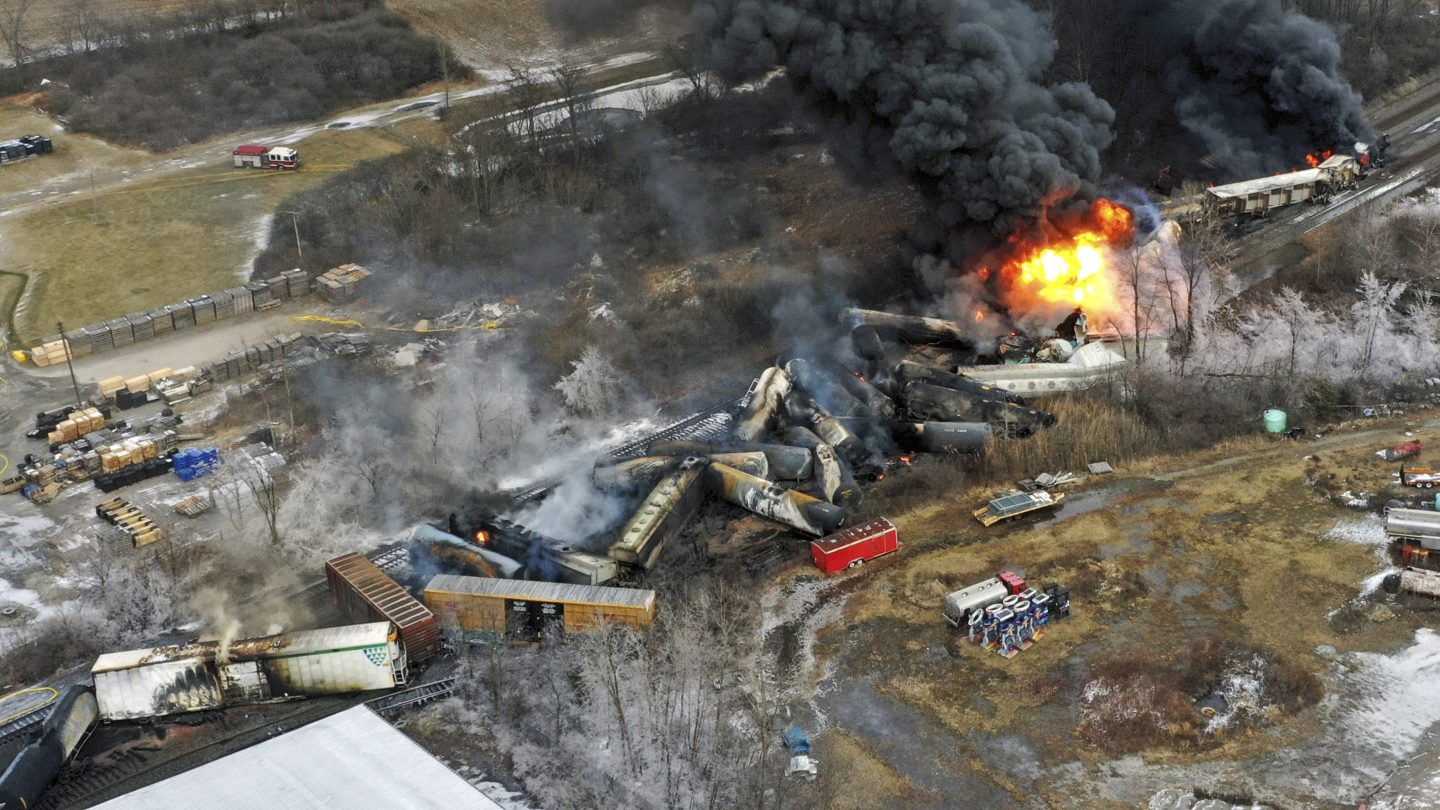Hours before a Norfolk Southern train derailed in Ohio and erupted in fire in February, a judge ruled a former railroad employee could proceed with a lawsuit claiming he had been harassed for years by managers who said he reported too many flaws in rail cars he inspected and had his job changed after reporting an injury.
Richard Singleton’s case against Norfolk Southern was settled for an undisclosed amount after the judge said he had enough evidence to go to trial over whether he was disciplined for reporting safety violations that slowed trains passing through a Macon, Georgia, railyard.
The settlement provided relief for Singleton, but does little for residents near East Palestine, Ohio, who worry about possible health effects from the accident’s toxic blaze. That derailment and others since inspired nationwide fears about railroad safety.
Lawyers and unions representing rail workers say there is an industry-wide pattern of retaliation against workers like Singleton who report safety violations or injuries. They contend workers often run afoul of managers who don’t want to jeopardize their bonuses, and retaliation discourages other workers from speaking up.
Rail safety has been in the spotlight since the Feb. 3 Ohio derailment, with Congress and regulators proposing reforms. But little has changed, apart from railroads promising to install 1,000 more trackside detectors to spot mechanical problems and reevaluate their responses to alerts from those devices.
“Since Wall Street took them over, railroads have put productivity ahead of safety,” lawyer Nick Thompson argued earlier this year on behalf of a fired engineer. He pointed to recent derailments in Ohio and Raymond, Minnesota. “People are being killed, towns are being evacuated, rivers are being poisoned, all in the name of profit.”
The railroads are working to eliminate such practices with policies prohibiting retaliation and myriad ways for workers fearful of retribution to report safety concerns, either directly to a manager or anonymously through an internal hotline.
Statistics from the Occupational Health and Safety Administration show the number of single-year whistleblower complaints filed against big railroads declined from the 218 reported in 2018 to 96 last year.
“I have zero tolerance for retaliation. And I’ve made that very clear. And in fact, the culture that we’re creating at Norfolk Southern is one of transparency and one in which people are encouraged to raise their hand and say they’ve got an issue,” CEO Alan Shaw said.
Other major railroads, including BNSF, Union Pacific, CPKC, Canadian National and CSX, echoed that sentiment in statements and said they encourage employees to report safety concerns.
Whistleblower cases represent a small fraction of the workforce numbering more than 100,000 nationwide. But even a handful of cases can instill fear among employees and have a chilling effect on safety reporting.
Long before Mike Ratigan was fired from CSX in New York last year after refusing to help circumvent federal safety standards or ignore railcar flaws, he said he saw other workers sanctioned. Those disciplinary cases became a “deer head” for managers: a trophy that sent a clear message.
“It says, if we can do it to him, we can do it to you,” Ratigan said.
OSHA says 793 whistleblower complaints were filed between 2018 and the end of July, with Norfolk Southern leading all railroads with 257. Union Pacific and CSX weren’t far behind with nearly 200 complaints apiece, while another 113 were reported at BNSF. The numbers are much smaller at the Canadian railroads partly because much of their operations are north of the border.
More than half of the complaints were dismissed after OSHA reviews. But that doesn’t tell the full story because some dismissed cases become federal lawsuits that can lead to multimillion-dollar judgments against railroads. OSHA’s decisions also can be appealed, with 87 cases settled before OSHA decided if they had merit.
The Associated Press reviewed dozens of whistleblower cases and found a similar pattern. When they weren’t bound by confidential settlement agreements, former railroad workers discussed how managers didn’t want them to report too many safety violations because they would slow trains. Some ex-employees prevailed in court, but they all faced tough battles against massive companies with billions of dollars in annual profits and armies of lawyers.
Mike Elliott was fired in 2011 after he went to the Federal Railroad Administration with safety concerns other workers reported to him in his capacity as Washington state’s top safety official with the Brotherhood of Locomotive Engineers and Trainmen union. The FRA responded with a special inspection that found 357 defects, angering his BNSF bosses.
One of his managers confronted Elliott in the parking lot and jumped on the hood of his car, claiming Elliott punched him and tried to run him down. Elliott said he was acquitted of those allegations in a criminal case, but ultimately was fired.
That started a yearslong court fight that included countless motions and a six-day trial before a jury awarded him $1.25 million and approved $500,000 in legal fees. After an appeal to the 9th Circuit, the railroad finally paid him in 2018.
“It’s a never-ending battle. They have the best lawyers. They have the best lobbyists and they have a lot of lobbyists. They have a lot of money, and you’re up against it.” Elliott said.
Dale Gourneau had a reputation as a “tenacious safety advocate” who may have written more “bad order” tags listing defects on railcars than anyone else in the Mandan, North Dakota, railyard where he worked for 18 years.
Gourneau pressed his managers to stop blocking employees from applying for corporate BNSF bonuses for finding broken railcar wheels. Not long after, he was written up for failing to properly stop his ATV before crossing the tracks in 2019. He was fired a few months later after the company alleged he violated the same rule a second time, even though he claimed to have followed the common practice of stopping several feet short of the tracks to avoid another set of tracks.
An administrative law judge ruled this spring that the discipline Gourneau received was merely pretext his managers conjured to fire him. The judge ordered BNSF to reinstate Gourneau and pay him $578,659 in back pay and penalties.
BNSF is appealing and declined to comment on specific cases.
For rail car inspector John Fulk, the situation got so bad that in 2011 he shot himself in the head in the parking lot of his workplace at a North Carolina Norfolk Southern railyard. His widow successfully argued in court that after being berated by managers for flagging too many cars for repairs, Fulk killed himself rather than face a disciplinary hearing and possible firing on trumped-up charges of trying to sabotage a train’s braking system.
Fulk’s case was allowed to move forward because he started the complaint process with regulators before his death. FRA investigators found numerous rule violations and his former coworkers told them Fulk had repeatedly been targeted by managers. But court documents say none of them would sign witness statements because they feared retribution. Norfolk Southern settled in 2015.
“Because of his adherence to FRA regulations, Mr. Fulk was subjected to abusive intimidation, disciplinary threats, and job threats by Norfolk Southern management,” U.S. District Judge William Osteen wrote. “Although he reported these acts and omissions, Norfolk Southern never took action to stop such treatment.”












